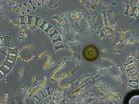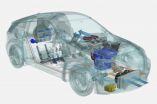(Press-News.org) CORVALLIS, Ore. - Researchers at Oregon State University have discovered how vitamin E deficiency may cause neurological damage by interrupting a supply line of specific nutrients and robbing the brain of the "building blocks" it needs to maintain neuronal health.
The findings - in work done with zebrafish - were just published in the Journal of Lipid Research. The work was supported by the National Institutes of Health.
The research showed that zebrafish fed a diet deficient in vitamin E throughout their life had about 30 percent lower levels of DHA-PC, which is a part of the cellular membrane in every brain cell, or neuron. Other recent studies have also concluded that low levels of DHA-PC in the blood plasma of humans is a biomarker than can predict a higher risk of Alzheimer's disease.
Just as important, the new research studied the level of compounds called "lyso PLs," which are nutrients needed for getting DHA into the brain, and serve as building blocks that aid in membrane repair. It showed the lyso PLs are an average of 60 percent lower in fish with a vitamin E deficient diet.
The year-old zebrafish used in this study, and the deficient levels of vitamin E they were given, are equivalent to humans eating a low vitamin E diet for a lifetime. In the United States, 96 percent of adult women and 90 percent of men do not receive adequate levels of vitamin E in their diet.
DHA is a polyunsaturated fatty acid, or PUFA, increasingly recognized as one of the most important nutrients found in omega-3 fatty acids, such as those provided by fish oils and some other foods.
"This research showed that vitamin E is needed to prevent a dramatic loss of a critically important molecule in the brain, and helps explain why vitamin E is needed for brain health," said Maret Traber, the Helen P. Rumbel Professor for Micronutrient Research in the College of Public Health and Human Sciences at OSU and lead author on this research.
"Human brains are very enriched in DHA but they can't make it, they get it from the liver," said Traber, who also is a principal investigator in the Linus Pauling Institute at OSU. "The particular molecules that help carry it there are these lyso PLs, and the amount of those compounds is being greatly reduced when vitamin E intake is insufficient. This sets the stage for cellular membrane damage and neuronal death."
DHA is the needed nutrient, Traber said, but it's lyso PLs which help get it into the brain. It's the building block.
"You can't build a house without the necessary materials," Traber said. "In a sense, if vitamin E is inadequate, we're cutting by more than half the amount of materials with which we can build and maintain the brain."
Some other research, Traber said, has shown that the progression of Alzheimer's disease can be slowed by increased intake of vitamin E, including one study published last year in the Journal of the American Medical Association. But that disease is probably a reflection of years of neurological damage that has already been done, she said. The zebrafish diet used in this study was deficient in vitamin E for the whole life of the fish - as is vitamin E deficiency in some humans.
Vitamin E in human diets is most often provided by dietary oils, such as olive oil. But many of the highest levels are in foods not routinely considered dietary staples - almonds, sunflower seeds or avocados.
"There's increasingly clear evidence that vitamin E is associated with brain protection, and now we're starting to better understand some of the underlying mechanisms," Traber said.
INFORMATION:
The study this story is based on is available online: http://bit.ly/1DtAIyU
PITTSBURGH, April, 13, 2015 - A serendipitous combination of technology and scientific discovery, coupled with a hunch, allowed University of Pittsburgh Cancer Institute (UPCI) researchers to reveal a previously invisible biological process that may be implicated in the rapid growth of some cancers.
The project, funded by the National Institutes of Health (NIH), is described in today's issue of the Proceedings of the National Academy of Sciences (PNAS).
"I was so amazed by what I was seeing," said lead author Masahiro Shuda, Ph.D., research assistant professor in Pitt's ...
HOUSTON - (April 13, 2015) - For decades, scientists and physicians have puzzled over the fact that infants with the postnatal neurodevelopmental disorder Rett syndrome show symptoms of the disorder from one to two years after birth.
In a report in the Proceedings of the National Academy of Sciences, Dr. Huda Zoghbi and her colleagues from Baylor College of Medicine and the Jan and Dan Duncan Neurological Research Institute at Texas Children's Hospital, unravel the mystery by looking at when and how the causal gene involved (methyl-CpG binding protein 2 or MECP2) binds ...
Fresh insights into how bacteria protect themselves - by forming a waterproof raincoat - could help develop improved products to protect plants from disease.
Researchers have discovered how communities of beneficial bacteria form a waterproof coating on the roots of plants, to protect them from microbes that could potentially cause plant disease.
Their insights could lead to ways to control this shield and improve its efficiency, which could help curb the risk of unwanted infections in agricultural or garden plants, the team says.
Scientists at the Universities of ...
A new analysis of the chemical make-up of meteorites has helped scientists work out when the Earth formed its layers.
The research by an international team of scientists confirmed the Earth's first crust had formed around 4.5 billion years ago.
The team measured the amount of the rare elements hafnium and lutetium in the mineral zircon in a meteorite that originated early in the solar system.
"Meteorites that contain zircons are rare. We had been looking for an old meteorite with large zircons, about 50 microns long, that contained enough hafnium for precise analysis," ...
Diversity of life abounds on Earth, and there's no need to look any farther than the ocean's surface for proof. There are over 200,000 species of phytoplankton alone, and all of those species of microscopic marine plants that form the base of the marine food web need the same basic resources to grow--light and nutrients.
A study by a team of scientists from the Woods Hole Oceanographic Institution (WHOI), University of Rhode Island (URI), and Columbia University, published April 13 in the Proceedings of the National Academy of Sciences reveals how species of diatoms--one ...
ANN ARBOR, Mich. - One of the brain's main jobs is information processing - what is critical, however, is that information in the brain gets transferred to the right places at the right times.
Research on large-scale brain networks by the University of Michigan Medical School reveals that "hubs" in the brain - highly connected regions that like hubs of the airport system - tend to consistently attract information flow.
"Understanding how information transfer occurs in the brain is critical, especially if network hubs are taken off line by anesthesia, tumor or stroke," ...
This news release is available in German.
How can a pleasant vehicle climate be achieved efficiently? Researchers at the Technische Universität München (TUM) pursued this question in the context of the research project Visio.M funded by the German Federal Ministry for Education and Research (BMBF) with a total of 7.1 million euro. The results of their research show that the potential of energy efficient air conditioning is all but exhausted. And this applies also to gasoline powered cars.
Inefficiency has its advantages, too: In the past, waste heat ...
Researchers are beginning to explore whether the genetics of patients who experience a placebo effect are different from those of patients who don't. It's well known that people can feel better if they believe they are receiving treatment, but the biological pathways involved are relatively unexplored. In a new review, publishing April 13 in Trends in Molecular Medicine, scientists at Beth Israel Deaconess Medical Center discuss what we know as well as possible ethical issues related to conducting genetic tests to determine whether a patient is a placebo responder.
"Understanding ...
A new strategy to rule-out and rule-in heart attacks in emergency departments will help physicians treat patients faster, found a clinical trial published in CMAJ (Canadian Medical Association Journal).
Acute myocardial infarction (MI) is a common cause of death and disability around the world. Early diagnosis is critical for treatment and survival.
Swiss and Spanish researchers conducted a clinical trial to determine whether a new technique, previously tested in a small pilot study, would be effective in determining whether a patient has had a heart attack. They enrolled ...
Family physicians have an important role in advising women about the benefits and risks of egg freezing, argues an analysis in CMAJ (Canadian Medical Association Journal).
"With growing public awareness of social egg freezing, Canadian women may increasingly approach physicians in search of information and advice about the procedure," writes Dr. Angel Petropanagos, Faculty of Medicine, Dalhousie University, Halifax, Nova Scotia, with coauthors Alana Cattapan, Françoise Baylis and Arthur Leader. "Family physicians are uniquely positioned at the front lines of medical ...


